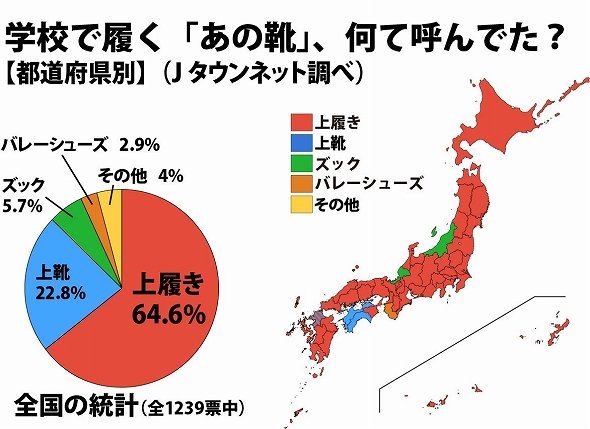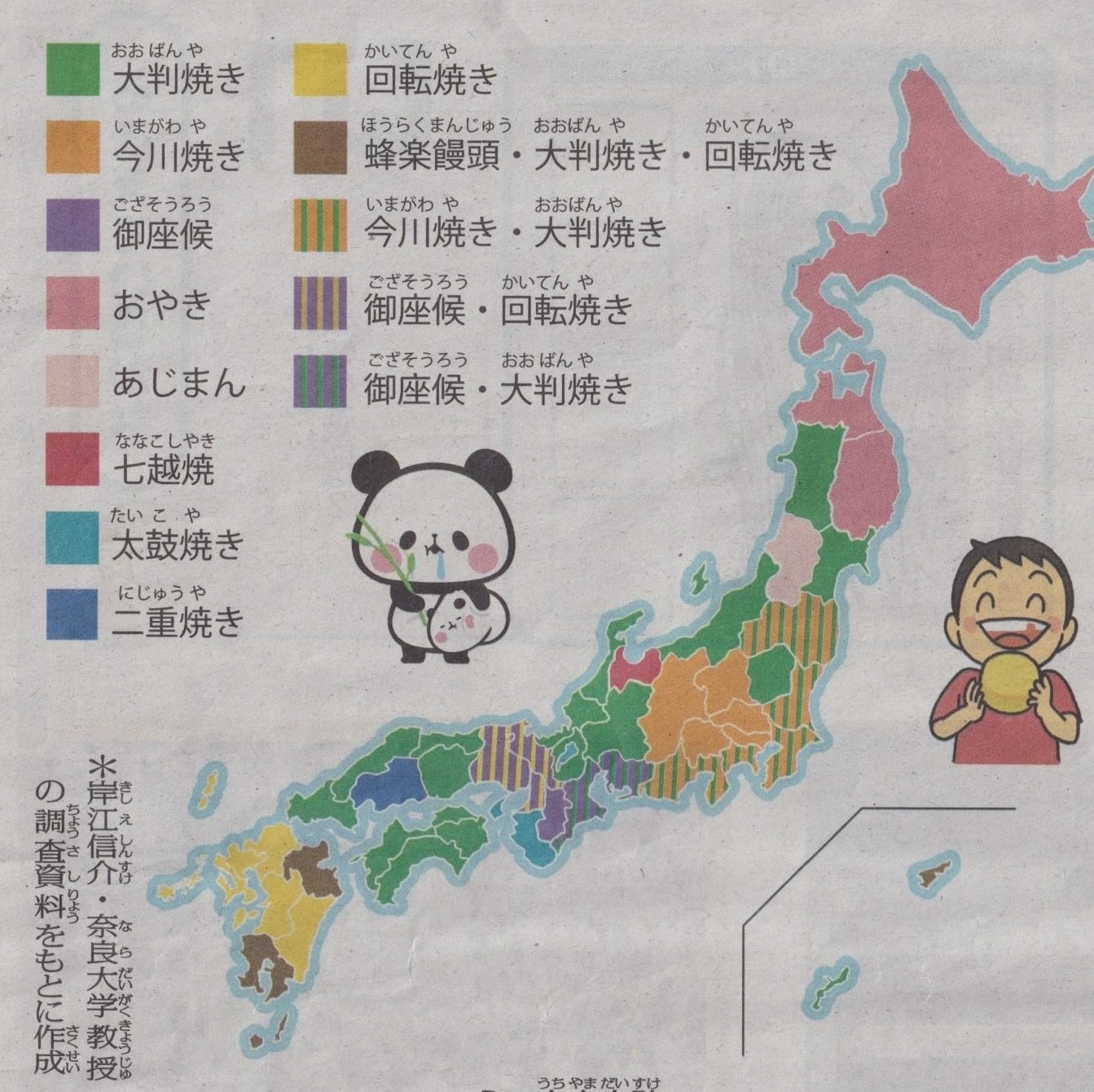Visiting Kyōto last month, it didn’t take long before I heard one of the more commonly known regionalisms: okini. The singsong way the people of Kyōto say, "Thank you", made me wonder if there were other ways in Japan of expressing one’s gratitude. I was surprised by what I discovered. I have put together a list of some of these local sayings.
Incidentally, the original meaning of arigatō (有り難う) conveyed the sense that the thing you were thanking a person for something that had been difficult for them to do (有るものが難しい) and you felt bad for having them do it. Dōmo (どうも) comes from dōshite-mo (どうしても), and emphasizes the feeling of gratitude or regret.
This is still a work in project and I will try to clean this up in the coming days.
Hokkaidō
1. Hokkaidō
Hokkaidō-ben
どうも!
Dōmo!
(Common among friends.)
どうもね!
Dōmo-ne!
(Same as saying dōmo.)
有り難う
Arigatō!
(Standard Japanese.)
なんも、なんも
Nanmo, nanmo!
(Includes the feeling of sorry, don’t worry about it.)
Tōhoku
2. Aomori
Tsugaru-ben
ありがどごしてす
Arigado goshidesu!
(This is the polite form.)
めやぐだの~
Meyagudanoh!
(Similar to saying meiwaku-o kakemashite sumimasen, sorry for causing you trouble.)
どうも
Dōmo!
(Same as Aomori.)
3. Iwate
4. Miyage
5. Akita
ぶじょほーだんし
Bujohohdanshi!
(Originates from the word buchōhō, meaning carelessness or blunder, sorry about that.)
どんも、おぎぃなぁ
Donmo, ogi-nā!
おぎぃ
Ogi!
(Southern Akita prefecture, i is shortened with falling accent.)
6. Yamagata
Yonezawa-ben
おしょうしな
Oshōshina!
(Not commonly used among youths.)
Shōnai-ben (northwestern Yamagata)
もっけだ
Mokkeda!
(Can be used to mean arigatō, gomen, dōmo, and so on.)
7. Fukushima
Kantō
8. Ibaraki
Ibaragi-ben
どーもね
Dōmo-ne!
9. Tochigi
すいません
Suimasen!
(Used when receiving something.)
10. Gunma
11. Saitama
Chichibu Region
わりぃねぇー
Warine~!
(Saying warui-ne but including the feeling of gratitude.)
12. Chiba
13. Tōkyō
Arigatō!
14. Kanagawa
Chūbu
15. Niigata
いかったいね
Ikattaine!
あんがとの
Angatono!
(Means arigatō-ne.)
おーぎにはや
Ōginihaya!
(North-central Niigata prefecture. Nearly extinct saying.)
いやいやいやいや、ど~もっス
Iya iya iya iya, dōmossu!
(May be a personal tick.)
16. Toyama
あんがとう
Angatō!
(Seems to be falling into disuse.)
Toyama-ben
気の毒な
Kinodoku-na!
(Expresses regret at having troubled someone by doing something for you.)
だいてやっちゃ
Daiteyaccha!
(Used when someone treats you to dinner or drinks.)
17. Ishikawa
Kanazawa-ben
あんやとごぜえみす
Anyato gozēmisu!
あんやと
Anyato!
18. Fukui
19. Yamanashi
20. Nagano
Shinshū-ben
あいとうですぁ
Aitō desu-a!
(Intonation similar to Kansai dialect. Desu-a is a contraction of Desu-wa.)
Īda-ben
かんな
Kanna!
(Kaniya is also said.)
おかたしけ
Okatashike!
(May be a corruption of katajikenai, which means to be grateful.)
おしょーしー
Oshōshī!
(Second and third syllables are extended. Includes the feeling of obligation and gratefulness.)
うれしいに
Ureshi-ni!
(Means one is happy/delighted, but conveys the same meaning as arigatô.)
ありがとや
Arigatoya!
(Arigato-na! is also possible.)
21. Gifu
22. Shizuoka
Enshū-ben
ありがとね
Arigato-ne.
23. Aichi
Nagoya-ben
ありがと
Arigáto!
(Accent on the ga, shortened to.)
ありがとさん
Arigato-san!
(A casual way to say thanks.)
Kansai
Ōkini!
Maido ōkini!
24. Mie
おおきにいー
Ōkinī!
(Accent on the final syllable.)
25. Shiga
26. Kyōto
おおきに
Ōkini!
(More common among the elderly. Intonation is important.)
27. Ōsaka
おおきに
Ōkini!
ありがとー
Arigatoh!
(Intonation is key, rising on last syllable.)
ありがとさん
Arigato-san!
まいどおおきに
Maido Ōkini!
(Used when, for example, thanking someone for their continued patronage.)
28. Hyōgo
Yura-ben (Awaji-shima)
おおきによ
Ōkiniyo!
29. Nara
30. Wakayama
Chūgoku
31. Tottori
Yonago-ben
だんだん
Dandan!
(Not common with younger residents of Yonago City.)
ようこそ
Yōkoso!
(In standard Japanese this phrase is said when expressing the gratitude felt when someone visits you.)
32. Shimane
33. Okayama
ごめんよぉ
Gomenyō!
(Used by women. Accent on go.)
わりいなぁ
Wariinā!
すまんなぁ
Sumannā!
(These two are used by men.)
34. Hiroshima
ありがとね
Arigato-ne!
(Accent placed on the ga and ne.)
すまんのう
Sumannō!
(Similar to sumimasen in meaning. More common among the elderly.)
35. Yamaguchi
ありがとうあります
Arigatō arimasu!
すまんのう
Sumannō!
(Meaning is closer to arigatō (thanks) than sumimasen (sorry).)
Iwaguni
すまだったねー
Sumadatta-nē!
(Strong accent on the final nê.)
Shikoku
36. Tokushima
Awa-ben (Northern central Tokushima prefecture.)
あんとー
Antō!
(May be nothing more than baby talk.)
おおけに
Ōkeni!
ありがとぐわした
Arigato guwashita!
37. Kagawa
ど~~も
Do~hmo.
(Be sure to let the word fall languidly from your lips.)
38. Ehime
39. Kōchi
Kyūshū
40. Fukuoka
ありがとー
Arigatō!
(Intonation and accent, like many of these is key. Spoken in a quick staccato, with an accent on the end.)
だんだん
Dandan!
(Apparently, this saying is fairly common among elderly women, but in all my years living in Fukuoka, I’ve never heard it. Means thanks so much.)
41. Saga
すんまっせん
Sunmassen
あんがとー
Angatō!
あんがちょー
Angachō!
おおきに
Ōkini!
(Same as Kyōto. Another person from Saga told me that no one says this.)
42. Nagasaki
Iki-ben (Islands in Nagasaki prefecture, west of Fukuoka prefecture.)
おおきん
Ōkin!
(Similar to ōkini.)
43. Kumamoto
すんまっせん
Sunmassen
(Also means excuse me, as in sumimasen.)
しょうじょう
Shōjō!
(An elegant way of saying thanks.)
44. Ōita
45. Miyazaki
あいがと
Arigato!
(Said with rising inflection.)
46. Kagoshima
あいがとごわした
Aigato gowashita!
おおきに
Ōkini
(Common among those born before 1955.)
あいがとさげもした
Aigato sagemoshita!
(Original Satsuma-ben. A polite expression)
あいがともしゃげもした
Aigato moshagemoshita!
(Polite form.)
Amami Ōshima (a collection of islands halfway between Kyūshū and Okinawa)
ありがっさまありょうた
Arigassama aryōta!
Okinawa
47. Okinawa
にへーでーびる
Nihēdēbiru!
Miyako-jima-ben
タンディガータンディ
Tandigātandi!



























